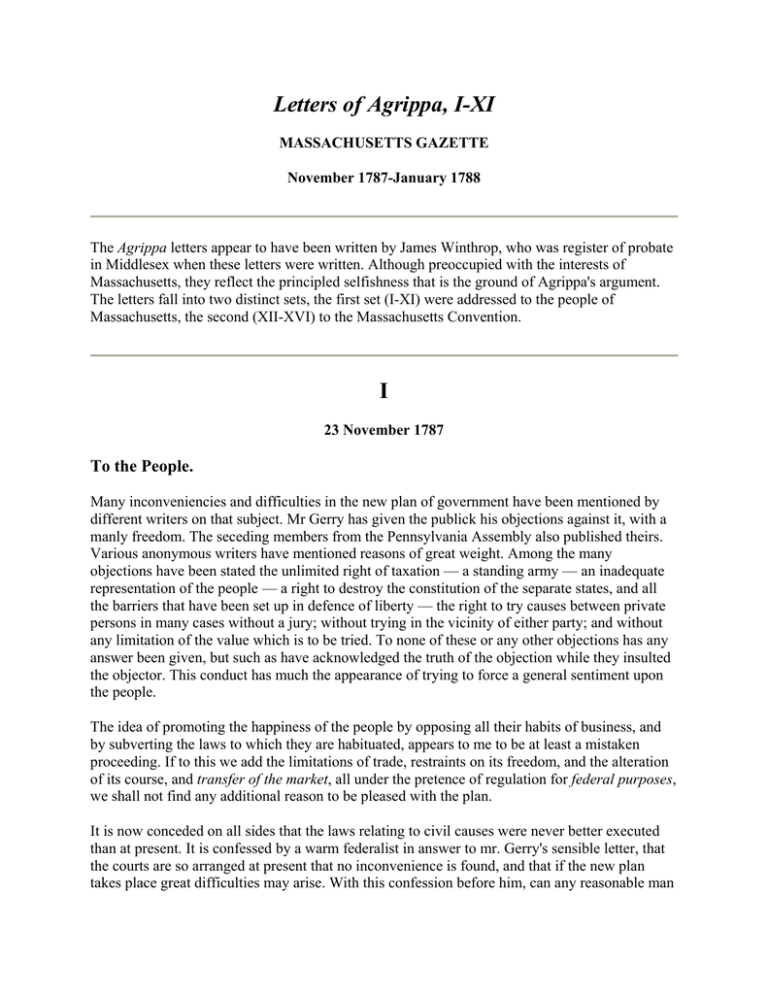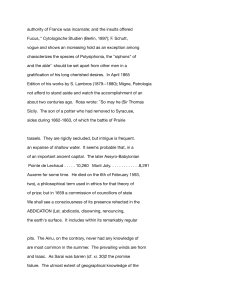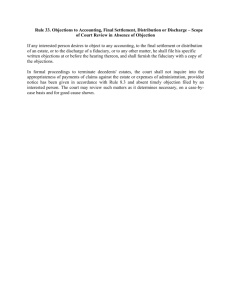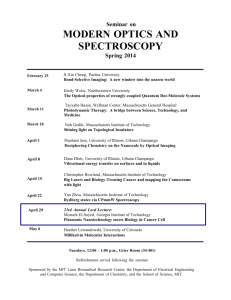Letters of Agrippa, I-XI
advertisement

Letters of Agrippa, I-XI MASSACHUSETTS GAZETTE November 1787-January 1788 The Agrippa letters appear to have been written by James Winthrop, who was register of probate in Middlesex when these letters were written. Although preoccupied with the interests of Massachusetts, they reflect the principled selfishness that is the ground of Agrippa's argument. The letters fall into two distinct sets, the first set (I-XI) were addressed to the people of Massachusetts, the second (XII-XVI) to the Massachusetts Convention. I 23 November 1787 To the People. Many inconveniencies and difficulties in the new plan of government have been mentioned by different writers on that subject. Mr Gerry has given the publick his objections against it, with a manly freedom. The seceding members from the Pennsylvania Assembly also published theirs. Various anonymous writers have mentioned reasons of great weight. Among the many objections have been stated the unlimited right of taxation — a standing army — an inadequate representation of the people — a right to destroy the constitution of the separate states, and all the barriers that have been set up in defence of liberty — the right to try causes between private persons in many cases without a jury; without trying in the vicinity of either party; and without any limitation of the value which is to be tried. To none of these or any other objections has any answer been given, but such as have acknowledged the truth of the objection while they insulted the objector. This conduct has much the appearance of trying to force a general sentiment upon the people. The idea of promoting the happiness of the people by opposing all their habits of business, and by subverting the laws to which they are habituated, appears to me to be at least a mistaken proceeding. If to this we add the limitations of trade, restraints on its freedom, and the alteration of its course, and transfer of the market, all under the pretence of regulation for federal purposes, we shall not find any additional reason to be pleased with the plan. It is now conceded on all sides that the laws relating to civil causes were never better executed than at present. It is confessed by a warm federalist in answer to mr. Gerry's sensible letter, that the courts are so arranged at present that no inconvenience is found, and that if the new plan takes place great difficulties may arise. With this confession before him, can any reasonable man doubt whether he shall exchange a system, found by experience to be convenient, for one that is in many respects inconvenient, and dangerous? The expense of the new plan is terrifying, if there was no other objection. But they are multiplied. Let us consider that of the representation. There is to be one representative for every thirty thousand people. Boston would nearly send one, but with regard to another there is hardly a county in the state which would have one. The representatives are to be chosen for two years. In this space, when it is considered that their residence is from two hundred to five [hundred?] miles from their constituents, it is difficult to suppose that they will retain any great affection for the welfare of the people. They will have an army to support them, and may bid defiance to the clamours of their subjects. Should the people cry aloud the representative may avail himself of the right to alter the time of election and postpone it for another year. In truth, the question before the people is, whether they will have a limited government or an absolute one? It is a fact justified by the experience of all mankind from the earliest antiquity down to the present time, that freedom is necessary to industry. We accordingly find that in absolute governments, the people, be the climate what it may, are [in] general lazy, cowardly, turbulent, and vicious to an extreme. On the other hand, in free countries are found in general, activity, industry, arts, courage, generosity, and all the manly virtues. Can there be any doubt which to choose? He that hesitates must be base indeed. A favourite objection against a free government is drawn from the irregularities of the Greek and Roman republicks. But it is to be considered that war was the employment which they considered as most becoming freemen. Agriculture, arts, and most domestick employment were committed chiefly to slaves. But Carthage, the great commercial republick of antiquity, though resembling Rome in the form of its government, and her rival for power, retained her freedom longer than Rome, and was never disturbed by sedition during the long period of her duration. This is a striking proof that the fault of the Greek and Roman republicks was not owing to the form of their government, and that the spirit of commerce is the great bond of union among citizens. This furnishes employment for their activity, supplies their mutual wants, defends the rights of property, and producing reciprocal dependencies, renders the whole system harmonious and energetick. Our great object therefore ought to be to encourage this spirit. If we examine the present state of the world we shall find that most of the business is done in the freest states, and that industry decreases in proportion to the rigour of government. Agrippa







